| Listing 1 - 10 of 12 | << page >> |
Sort by
|
Book
ISBN: 8487840051 Year: 1991 Publisher: Madrid Universidad Pontificia Comillas
Abstract | Keywords | Export | Availability | Bookmark
 Loading...
Loading...Choose an application
- Reference Manager
- EndNote
- RefWorks (Direct export to RefWorks)
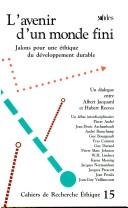
ISBN: 9782762115420 2762115426 Year: 1991 Publisher: Saint-Laurent (Quebec): Fides,
Abstract | Keywords | Export | Availability | Bookmark
 Loading...
Loading...Choose an application
- Reference Manager
- EndNote
- RefWorks (Direct export to RefWorks)
Environmental ethics --- Nature conservation --- Environmental protection
Book
ISBN: 041506015X 9780415060158 Year: 1991 Publisher: London : Routledge,
Abstract | Keywords | Export | Availability | Bookmark
 Loading...
Loading...Choose an application
- Reference Manager
- EndNote
- RefWorks (Direct export to RefWorks)
Ethics. --- Social ethics. --- Environmental ethics. --- Medical ethics. --- Applied philosophy.
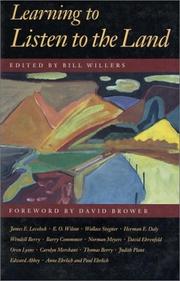
ISBN: 1610912845 9781610912846 155963121X 9781559631211 1559631201 9781559631204 Year: 1991 Publisher: Washington, DC Island Press
Abstract | Keywords | Export | Availability | Bookmark
 Loading...
Loading...Choose an application
- Reference Manager
- EndNote
- RefWorks (Direct export to RefWorks)
In this inspired collection, some of America's most provocative thinkers and writers reflect on nature and enviornmetnal science--reaching compelling conclusions about humanity's relationship to the earth. Balanced by science and fact, Learning to Listen to the Land explains the significance of our modern environmental crisis. The authors underscore the necessity forworking within, rather than counter to, our larger ecosystem.Learning to Listen to the Land represents the sounding of an alarm. It's authors call on us to recognize the consequences of our actions, and inactions, and to develop a sense of connection with the earth.
Environmental Protection --- Human Ecology --- Environmental Ethics --- Nature --- Philosophy
Book
Year: 1991 Publisher: Athens: Biopolitics International Organisation,
Abstract | Keywords | Export | Availability | Bookmark
 Loading...
Loading...Choose an application
- Reference Manager
- EndNote
- RefWorks (Direct export to RefWorks)
Environmental sciences --- Environmental education --- Biopolitics --- Biodiversity --- Environmental ethics
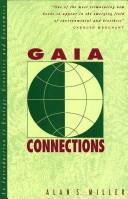
ISBN: 0847676560 Year: 1991 Publisher: Totowa Rowman & Littlefield
Abstract | Keywords | Export | Availability | Bookmark
 Loading...
Loading...Choose an application
- Reference Manager
- EndNote
- RefWorks (Direct export to RefWorks)
Economic development --- Environmental ethics --- Environmental policy --- Environmental aspects
Book
ISBN: 0883447401 Year: 1991 Publisher: Maryknoll Orbis Books
Abstract | Keywords | Export | Availability | Bookmark
 Loading...
Loading...Choose an application
- Reference Manager
- EndNote
- RefWorks (Direct export to RefWorks)
Creation --- Environmental ethics --- Human ecology --- Religious aspects --- Christianity
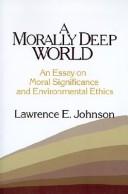
ISBN: 0521393108 9780521393102 Year: 1991 Publisher: Cambridge University press
Abstract | Keywords | Export | Availability | Bookmark
 Loading...
Loading...Choose an application
- Reference Manager
- EndNote
- RefWorks (Direct export to RefWorks)
Ecology --- Environmental ethics. --- Animal rights. --- Moral and ethical aspects. --- Ecology - Moral and ethical aspects.
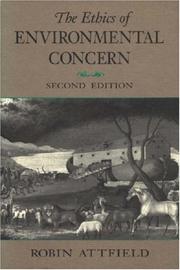
ISBN: 0820313440 Year: 1991 Publisher: Athens, GA : University of Georgia Press,
Abstract | Keywords | Export | Availability | Bookmark
 Loading...
Loading...Choose an application
- Reference Manager
- EndNote
- RefWorks (Direct export to RefWorks)
Examines traditional attitudes toward nature and the degree to which these attitudes enable people to cope with modern ecological problems. It looks particularly at the Judaeo-Christian heritage of belief in man's dominion, the tradition of stewardship and the more recent belief in progress.
Environmental ethics. --- Environmental quality --- Human ecology --- Ethics --- Moral and ethical aspects

ISBN: 0820340251 0820313491 Year: 1991 Publisher: University of Georgia Press
Abstract | Keywords | Export | Availability | Bookmark
 Loading...
Loading...Choose an application
- Reference Manager
- EndNote
- RefWorks (Direct export to RefWorks)
First published in 1983, The Ethics of Environmental Concern has become a classic in the relatively new field of environmental ethics. Examining traditional attitudes toward nature, and the degree to which these attitudes enable us to cope with modern ecological problems, Robin Attfield looks particularly at the Judeo-Christian heritage of belief in humankind's dominion, the tradition of stewardship, and the more recent belief in progress to determine the extent to which these attitudes underlie ecological problems and how far they embody resources adequate for combating such problems. He then examines concerns of applied ethics and considers our obligations to future generations, the value of life, and the moral standing and significance of nonhumans. Simultaneously, he offers and defends a theory of moral principles appropriate for dealing with such concerns as pollution, scarce natural resources, population growth, and the conservation and preservation of the environment.The second edition includes a new preface and introduction, as well as a bibliographic essay and an updated list of references incorporating relevant scholarship since the publication of the first edition.
Environmental ethics. --- Environmental quality --- Human ecology --- Ethics --- Moral and ethical aspects --- Conservation of the environment
| Listing 1 - 10 of 12 | << page >> |
Sort by
|

 Search
Search Feedback
Feedback About UniCat
About UniCat  Help
Help News
News